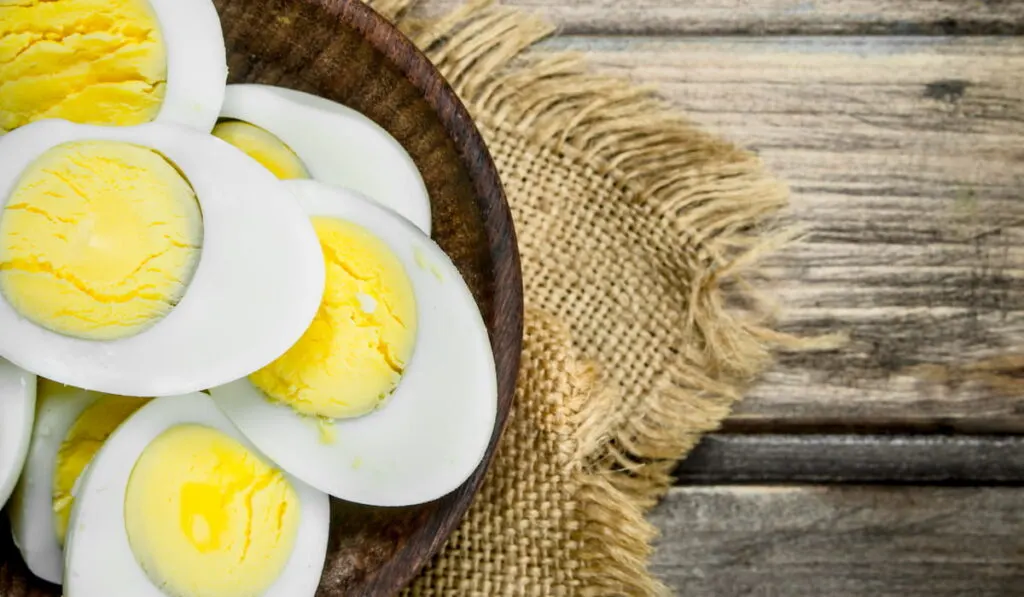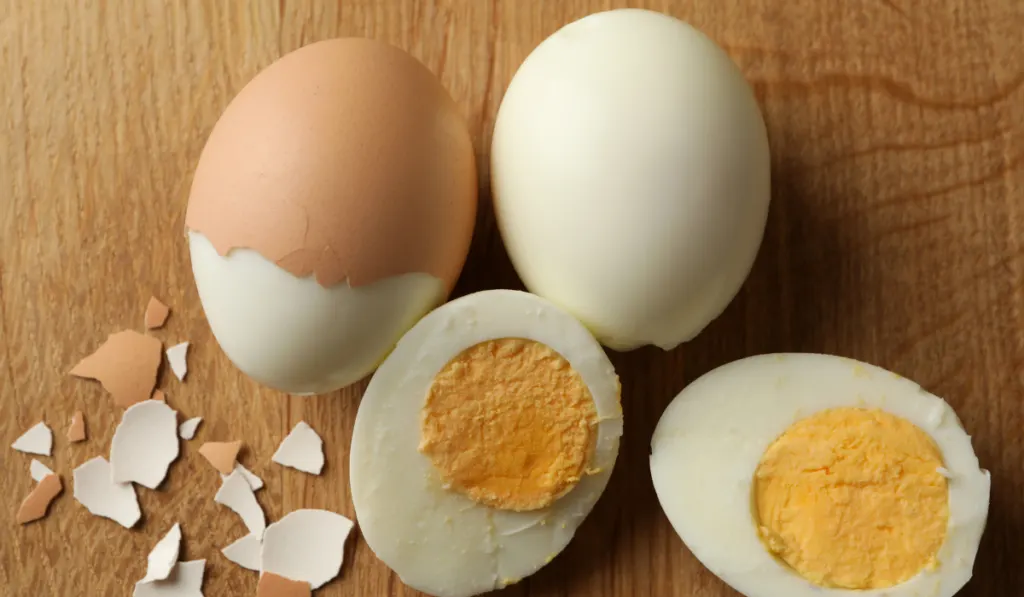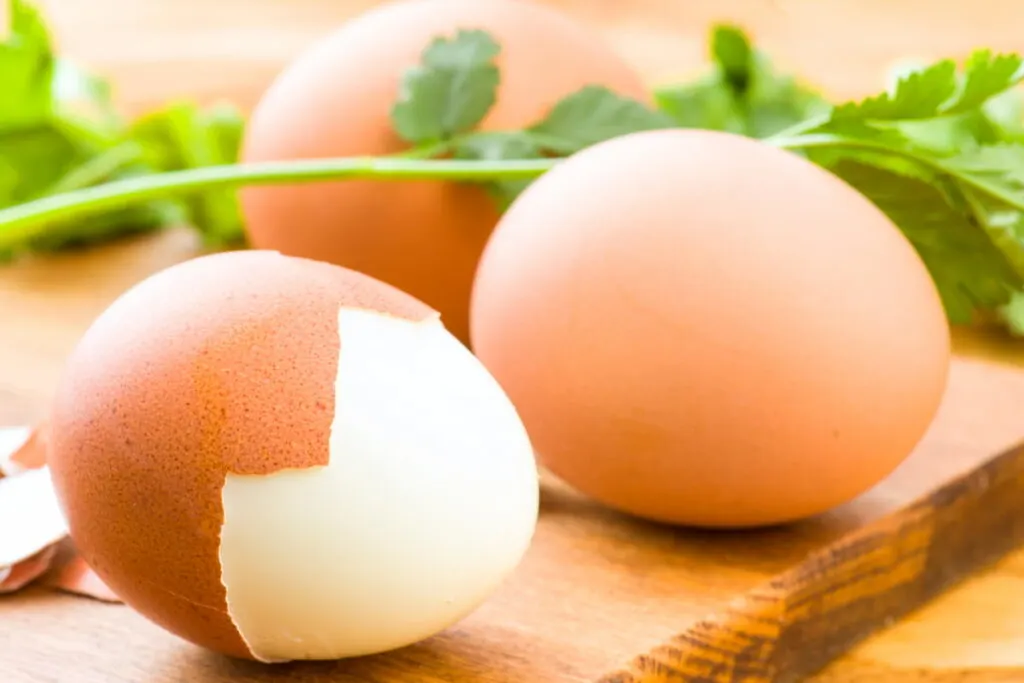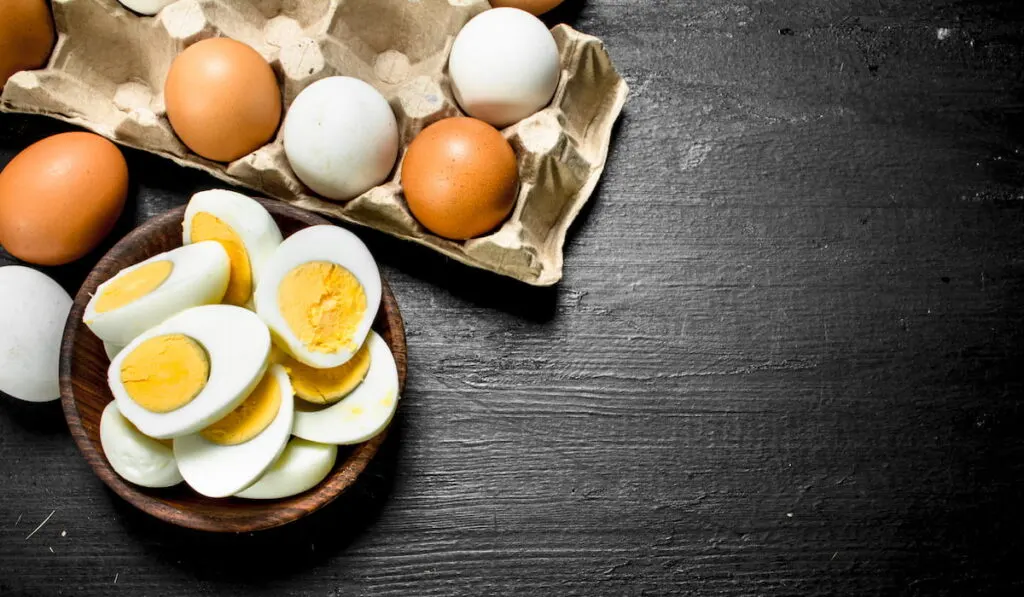A hard-boiled egg will usually last around one week in the fridge after you boil it. It will have an even shorter shelf life if you keep it somewhere, like the countertop, where it’s at room temperature.
You can typically spot a bad hard-boiled egg by its smell. It will put off a sulfuric smell more substantial than usual, and it can be so off-putting that you won’t want to be near it.
In addition, a rotten boiled egg will have a slimy texture. On the other hand, it can also dry out from sitting too long and turn chalky when you bite into it.

Eating a boiled egg that smells bad or tastes funny is never a good idea. Rotten eggs will make you sick and, in some cases, can give you a severe illness.
Here are some tips on how to tell if a hard-boiled egg is bad and how long you can expect to eat boiled eggs once you cook them.
Table of Contents
Signs Your Boiled Eggs Are Bad
The smell will be the first thing you’ll notice when you come across a bad boiled egg. It will smell rancid and not at all like something you will want to eat. Hard-boiled eggs already have intense aromas, but they’re pleasant to people who enjoy eating them.
On the other hand, a rotten boiled egg smells foul. If left to sit for too long, it will stink up and leave a foul smell in your refrigerator or kitchen.
If it passes the smell test, the next thing you’ll want to do is look it over before you eat it. A hard-boiled egg in decent condition will have a bright white outer layer, and the yolk will be yellow.
There shouldn’t be any excess liquid leaking out of the egg. It shouldn’t be especially juicy when you crack it open. If you take it straight out of the boiling water and open it, there will likely be some water runoff. However, a cold hard-boiled egg should be dry when cracked open.
Once you check that the smell is good and it looks ok, it’s time for a taste test. A hard-boiled egg should taste like eggs! With a dash of salt and pepper, it’s a nice healthy snack with a good amount of protein.
A bad egg, on the other hand, will have a slimy or chalky texture. It will feel gooey in your mouth and won’t go down easily.

How Long Do Boiled Eggs Last?
Boiled eggs usually last around a week after you cook them. You can boil several at once and keep them in their egg carton in the fridge if you’re going to be eating them soon. This is a terrific option if you’re boiling eggs to use for an egg salad or to slice for deviled eggs.
However, if you’re not eating your eggs right away or the next day, you’ll want something that protects them better. So, what’s the best way to store boiled eggs?
Store your eggs in an air-tight container that prevents anything else from touching the eggs or getting them wet. One of the most common ways hard-boiled eggs become spoiled is when something else touches them.
Of course, your eggs will eventually go bad if you leave them in the fridge for long enough. Anything past a week is pushing it, and you’re better off throwing them away and cooking new eggs.

Can Boiled Eggs Be Frozen?
People who want more protein in their diets generally eat a lot of eggs. They are a tasty, affordable option with good protein compared to their calories and other nutritional information. That means they’re boiling a lot of eggs to put in meals or to use as snacks.
If you’re cooking many eggs at once, you can freeze them to keep them for longer than a week. When freezing boiled eggs, it’s typically best to keep the yolks inside the egg whites. They help keep the white healthy with a good texture when you thaw them. Without the yolks, the whites turn rubbery and lose a lot of their flavor.
Freezing eggs is a great option but requires a bit of planning. First, you’ll need a few hours to thaw the eggs before you can eat them.
Is There a Difference in Longevity: Brown Eggs vs. White Eggs?
Some people swear that there is a difference in taste between white and brown eggs. However, the egg color usually has more to do with the feather colors of the hen that lays the eggs rather than any nutritional factor.
As a result, there’s no difference in how long a brown boiled egg will last compared to a white egg. They’ll both last about a week in the fridge and longer if you freeze them.

Don’t Crack the Shells Until You Are Ready to Eat Them
One nice tip for people storing hard-boiled eggs is to postpone cracking the shells and peeling the eggs until just before you eat them. Eggs lose moisture through their shells, so if you keep the shells intact, they will hold in the flavor and prevent the eggs from drying out.
Conclusion
Whatever you do, avoid keeping your boiled eggs at room temperature any longer than necessary. Instead, move them to the fridge or freezer as soon as possible unless you’re eating them or mixing them into another recipe.
Keep them in the fridge or freezer in a container with hard edges to prevent them from hitting something and cracking their shells. If you peel the shells, put a damp paper towel on the bottom of the container and lay another moist paper towel over the eggs before you seal them.
